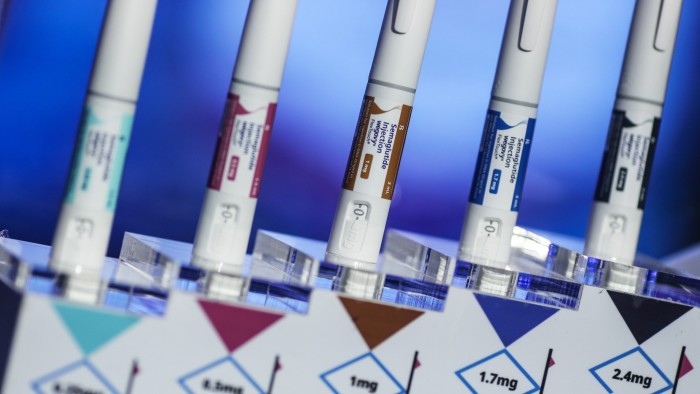Unlock the White House Watch newsletter for free
Your guide to what Trump’s second term means for Washington, business and the world
The two biggest weight-loss drugmakers have lost $252bn in value this year, as investor enthusiasm for obesity treatments wanes and Donald Trump’s tariff and price-cut threats weigh on the pharmaceutical sector.
The boom in weight-loss and diabetes drugs such as Novo Nordisk’s Wegovy and Ozempic and Eli Lilly’s Zepbound and Mounjaro had been a bright spot for the pharmaceutical industry as it contends with heightened political uncertainty.
But shareholders have soured on Novo and Lilly, worried about the rise of copycat drugs in the US and disappointing trial results from the next generation of medicines.
The pair were also among 17 pharmaceutical companies that received letters from Trump at the end of July demanding they lower drug prices in the US or face consequences, as the president presses ahead with his aggressive trade policy.
Since their peak last year, the decline is more pronounced. Novo Nordisk has lost $367bn in value since its peak in June 2024, a fall of more than two-thirds, while Lilly has fallen 29 per cent from a record valuation last year, wiping $250bn off its market capitalisation.
The makers of weight-loss drugs are vulnerable to stock market swings like any other area of the pharma sector, said Evan Seigerman, an analyst at BMO Capital Markets.
“The obesity franchise businesses were supposed to save everyone . . . but in reality, these are complex markets with ups and downs and risks,” he said.
Denmark’s Novo Nordisk, which ousted its chief executive in May, has fallen 49 per cent this year, shedding $166bn in value, and has been losing ground to Lilly. Its fourth-largest shareholder, Norway’s $2tn oil fund, this week said its holdings in the group had lost $1.2bn in value in the first half of the year.
Lilly has lost $86bn in value in 2025, an 11 per cent drop, with the stock selling off this month after it reported a disappointing trial result for its highly anticipated oral weight-loss drug orforglipron. Its shares this week traded at their lowest since February 2024 before mounting a partial recovery.
The combined drop in the companies’ market capitalisation this year is roughly equivalent to the entire value of luxury goods group Hermès, one of Europe’s most valuable corporates.
Wider concerns around tariffs and prices cuts have weighed on the pharma sector more broadly.
The top 10 US and European groups in the sector have lost an aggregate $128bn in market capitalisation this year, excluding foreign exchange movements, leaving their equity with a combined value of $2.8tn on Friday afternoon.
Merck, Pfizer and Roche have all traded lower, while gains at AbbVie, AstraZeneca, Novartis, Johnson & Johnson and Amgen have been far outweighed by the loss in value at Lilly and Novo.
The prospect of Trump’s “most favoured nation” pricing policy shaking up the pharma business model and threatening profitability was keeping investors on the sidelines, said Gareth Powell, a healthcare fund manager at Polar Capital.
“If you’re a generalist investor, why are you putting money here, versus buying an AI stock, [given] the headwinds of both tariffs and the most favoured nation policy?” he added.
Despite another good earnings season, the sector was now trading at its lowest price-to-earnings ratio for more than a decade, he said. But investors “throwing in the towel” on Eli Lilly this month was a sign that sentiment could be about to turn, Powell said.
In a sign of confidence at Lilly, five directors and executives bought stock in the company following its disappointing earnings report this month, the first insider buys in three years. Chief executive Dave Ricks bought $1.1mn on Tuesday, his largest purchase in more than a decade at the company.
The purchases sent “a compelling message that insiders view the sell-off as overdone”, said VerityData, which tracks insider transactions, in a report this week.

